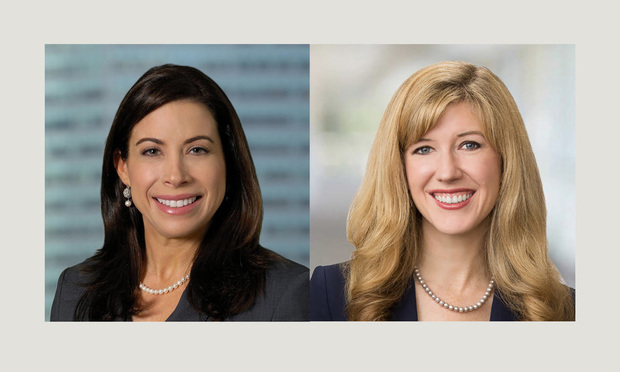Texas-Style Appeal for Litigation Finance – Monetizing Claims Even While Case Drags On
When it comes to commercial litigation, a trial victory -- to paraphrase Winston Churchill -- may not be the end or even the beginning of the end,…
November 14, 2019 at 06:21 PM
6 minute read
 Laina Miller Hammond (left), an investment manager & legal counsel with Validity Finance and April L. Farris (right), a partner with Yetter Coleman.
Laina Miller Hammond (left), an investment manager & legal counsel with Validity Finance and April L. Farris (right), a partner with Yetter Coleman.
When it comes to commercial litigation, a trial victory — to paraphrase Winston Churchill — may not be the end or even the beginning of the end, but rather the end of the beginning.
Judgments in commercial lawsuits are often subject to lengthy appeals. A complex case can often take over a year to resolve in Texas intermediate courts, and a further appeal to the Texas Supreme Court is likely to follow, which can take years to reach final resolution. The appeal process can mean significant additional expense for all parties involved and add further economic stress to claimants. Likewise, law firms representing the client on a full or partial contingency also must wait to recoup their fee, which remains at risk until the judgment is paid.
Other times, the losing defendant simply refuses to pay the judgment, forcing the client to find and recover the defendant's assets, sometimes across the world. Like an appeal, enforcement and collection efforts can require significant investments of time and money, ultimately delaying the client's ability to enjoy the fruits of the litigation.
Many companies emerging from litigation may lack the additional capital or desire to weather a long and uncertain appeal or enforcement effort. Yet, these same companies are loath to abandon their hard-earned judgment.
Litigation finance can provide options to alleviate much of the waiting, risk, and expense of an appeal or asset recovery effort.
Monetizing Judgments
Instead of the client waiting for a final resolution, litigation finance can monetize — or advance — a significant portion of the judgment value. Monetizing provides immediate capital to a company to put toward business needs and priorities. The company is able to unlock the value of the judgment now in exchange for a portion of the ultimate recovery later.
A client holding a judgment faces the risk of the judgment being overturned on appeal or turn out to be partially or entirely uncollectable. Through monetization, that risk is transferred in large part to the litigation funder financing on a non-recourse basis. The funder's return on its investment only comes from the case recovery. If the case is unsuccessful, the client owes the funder nothing.
Many clients choose to monetize a portion of their judgments in order to gain the certainty of some return on their investment in the case. In such cases, the client remains the party in interest in the case and retains the responsibility for pursuing and control over the appeal or collection, but now does so with the funder's capital.
For example, imagine a company has won a judgment of $40 million in Harris County district court and the defendant appeals and the case is assigned to the Houston 1st Court of Appeals. A litigation funder advances $15 million, which the company uses partially to pay the fees and costs of the appeal and partially to market a new product. If the company wins the appeal and collects the judgment, the funder will be entitled to a pre-negotiated return—usually a multiple of its original investment or, in some cases, a percentage of the eventual recovery. If the company loses the appeal, the company has still recovered $15 million, rather than $0.
Law firms with a contingent fee interest in a substantial judgment or award can likewise use litigation finance to liquidate a portion of their fee and ensure some guaranteed revenue. Monetization enables the law firm to spread some of its risk in the case to the litigation funder.
Funding for Appeals
Litigation funding can also be used to help pay the attorney fees and costs of the appeal itself. Appellate funding is similar to funding litigation at earlier stages. However, in cases in which a judgment has been secured, the factual record and legal issues in the case are far clearer than earlier in the case. As such, appeals typically carry less risk than cases at earlier stages in litigation, usually permitting the funder to offer more favorable rates. That said, an appeal is hardly without risk. Each stage of review brings additional uncertainty. The mixed composition of Republican and Democrat judges currently sitting on the Texas courts of appeals adds yet another element of uncertainty to the case.
The funder conducts diligence on these risk points and others and assesses the likely outcome of the appeal. If the funder decides to proceed, it will pay for a portion of the fees and costs of the appeal in exchange for a negotiated return on its investment.
As with monetization and earlier-stage litigation finance, in appellate funding, control over legal strategy and decisions remains entirely with the client and its counsel and the funding is non-recourse. Importantly, with monetization or appellate funding, a client no longer burdened by the financial strain of the case will be less likely to be forced to accept an unfairly low settlement offer from the opposing party.
Funding for Asset Recovery and Collection Efforts
Even once a client obtains a final judgment, either with or without surviving an appeal, a defeated party may nonetheless refuse to pay, hide assets and put the onus on the client to enforce it.
Judgment enforcement often involves a lengthy and complex process of locating and recovering assets to satisfy the judgment. For some international defendants who maintain significant assets abroad, the asset search and recovery effort may span the globe.
Litigation funding can support a company's enforcement efforts in two key ways. First, the right funder has experience in asset recovery and a network of trusted experts, including forensic accountants, investigators and lawyers who specialize in enforcement litigation. Companies of all sizes who are inexperienced in judgment collection can benefit from the expertise and network a sophisticated funder offers.
Second, litigation funders provide non-recourse capital to hire the right experts and attorneys and to pursue the most effective enforcement strategy. Oftentimes, a client's litigation budget does not include the additional expense of judgment enforcement and collection, which can be substantial. Litigation funding can provide financial relief for a company already expending significant money on the litigation up to that point.
Conclusion
Litigation funding can help companies minimize their cost and risk at a critical point in their lawsuit — after a judgment has been secured but before it has been paid. Whether used to monetize the judgment or fund an appeal or collection effort, funding, in the right circumstances, can provide much-needed capital and peace of mind to litigation-weary clients and their lawyers.
Laina Miller Hammond is an investment manager with Validity Finance, a commercial litigation funder, and head of the firm's Houston office. April L. Farris is a Houston-based partner with YetterColeman LLP and practices appellate law and commercial litigation.
This content has been archived. It is available through our partners, LexisNexis® and Bloomberg Law.
To view this content, please continue to their sites.
Not a Lexis Subscriber?
Subscribe Now
Not a Bloomberg Law Subscriber?
Subscribe Now
NOT FOR REPRINT
© 2025 ALM Global, LLC, All Rights Reserved. Request academic re-use from www.copyright.com. All other uses, submit a request to [email protected]. For more information visit Asset & Logo Licensing.
You Might Like
View All
Conspiracy Suits Against Quinn Emanuel, Roc Nation Moved to Federal District Court

Federal Judge Approves Harvard's Dismissal of Chip-Patent Suit Against Samsung
2 minute read

Law Firms Mentioned
Trending Stories
Who Got The Work
J. Brugh Lower of Gibbons has entered an appearance for industrial equipment supplier Devco Corporation in a pending trademark infringement lawsuit. The suit, accusing the defendant of selling knock-off Graco products, was filed Dec. 18 in New Jersey District Court by Rivkin Radler on behalf of Graco Inc. and Graco Minnesota. The case, assigned to U.S. District Judge Zahid N. Quraishi, is 3:24-cv-11294, Graco Inc. et al v. Devco Corporation.
Who Got The Work
Rebecca Maller-Stein and Kent A. Yalowitz of Arnold & Porter Kaye Scholer have entered their appearances for Hanaco Venture Capital and its executives, Lior Prosor and David Frankel, in a pending securities lawsuit. The action, filed on Dec. 24 in New York Southern District Court by Zell, Aron & Co. on behalf of Goldeneye Advisors, accuses the defendants of negligently and fraudulently managing the plaintiff's $1 million investment. The case, assigned to U.S. District Judge Vernon S. Broderick, is 1:24-cv-09918, Goldeneye Advisors, LLC v. Hanaco Venture Capital, Ltd. et al.
Who Got The Work
Attorneys from A&O Shearman has stepped in as defense counsel for Toronto-Dominion Bank and other defendants in a pending securities class action. The suit, filed Dec. 11 in New York Southern District Court by Bleichmar Fonti & Auld, accuses the defendants of concealing the bank's 'pervasive' deficiencies in regards to its compliance with the Bank Secrecy Act and the quality of its anti-money laundering controls. The case, assigned to U.S. District Judge Arun Subramanian, is 1:24-cv-09445, Gonzalez v. The Toronto-Dominion Bank et al.
Who Got The Work
Crown Castle International, a Pennsylvania company providing shared communications infrastructure, has turned to Luke D. Wolf of Gordon Rees Scully Mansukhani to fend off a pending breach-of-contract lawsuit. The court action, filed Nov. 25 in Michigan Eastern District Court by Hooper Hathaway PC on behalf of The Town Residences LLC, accuses Crown Castle of failing to transfer approximately $30,000 in utility payments from T-Mobile in breach of a roof-top lease and assignment agreement. The case, assigned to U.S. District Judge Susan K. Declercq, is 2:24-cv-13131, The Town Residences LLC v. T-Mobile US, Inc. et al.
Who Got The Work
Wilfred P. Coronato and Daniel M. Schwartz of McCarter & English have stepped in as defense counsel to Electrolux Home Products Inc. in a pending product liability lawsuit. The court action, filed Nov. 26 in New York Eastern District Court by Poulos Lopiccolo PC and Nagel Rice LLP on behalf of David Stern, alleges that the defendant's refrigerators’ drawers and shelving repeatedly break and fall apart within months after purchase. The case, assigned to U.S. District Judge Joan M. Azrack, is 2:24-cv-08204, Stern v. Electrolux Home Products, Inc.
Featured Firms
Law Offices of Gary Martin Hays & Associates, P.C.
(470) 294-1674
Law Offices of Mark E. Salomone
(857) 444-6468
Smith & Hassler
(713) 739-1250






